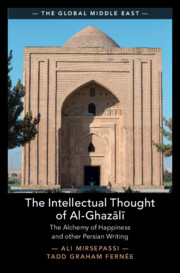5 results

The Intellectual Thought of Al-Ghazālī
-
- Published online:
- 16 January 2025
- Print publication:
- 19 December 2024
7 - Ghazālī’s Practical Ethics
-
- Book:
- The Intellectual Thought of Al-Ghazālī
- Published online:
- 16 January 2025
- Print publication:
- 19 December 2024, pp 208-238
-
- Chapter
- Export citation
2 - Reading Ghazālī in the West
-
- Book:
- The Intellectual Thought of Al-Ghazālī
- Published online:
- 16 January 2025
- Print publication:
- 19 December 2024, pp 57-83
-
- Chapter
- Export citation
Introduction
-
- Book:
- The Intellectual Thought of Al-Ghazālī
- Published online:
- 16 January 2025
- Print publication:
- 19 December 2024, pp 1-16
-
- Chapter
- Export citation
5 - Swearing Abū al-Jaysh into Office: The Loyalties of Ṭūlūnid Egypt
- from Part I - Personal ties
-
-
- Book:
- Mechanisms of Social Dependency in the Early Islamic Empire
- Published online:
- 06 December 2024
- Print publication:
- 28 November 2024, pp 150-172
-
- Chapter
-
- You have access
- Open access
- Export citation

